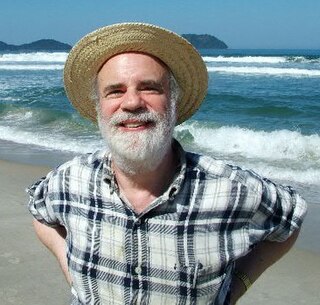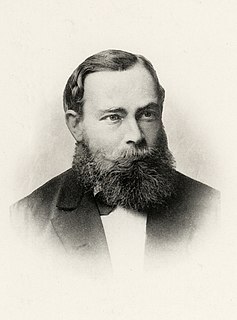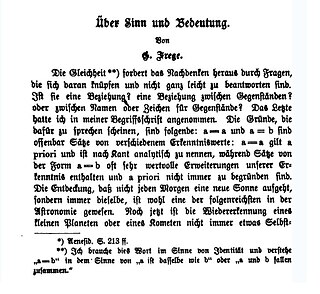Related Research Articles
Existence is the ability of an entity to interact with physical reality. In philosophy, it refers to the ontological property of being.
First-order logic—also known as predicate logic, quantificational logic, and first-order predicate calculus—is a collection of formal systems used in mathematics, philosophy, linguistics, and computer science. First-order logic uses quantified variables over non-logical objects, and allows the use of sentences that contain variables, so that rather than propositions such as "Socrates is a man", one can have expressions in the form "there exists x such that x is Socrates and x is a man", where "there exists" is a quantifier, while x is a variable. This distinguishes it from propositional logic, which does not use quantifiers or relations; in this sense, propositional logic is the foundation of first-order logic.

In mathematical logic, Russell's paradox is a set-theoretic paradox discovered by the British philosopher and mathematician Bertrand Russell in 1901. Russell's paradox shows that every set theory that contains an unrestricted comprehension principle leads to contradictions. The paradox had already been discovered independently in 1899 by the German mathematician Ernst Zermelo. However, Zermelo did not publish the idea, which remained known only to David Hilbert, Edmund Husserl, and other academics at the University of Göttingen. At the end of the 1890s, Georg Cantor – considered the founder of modern set theory – had already realized that his theory would lead to a contradiction, which he told Hilbert and Richard Dedekind by letter.

Saul Aaron Kripke is an American philosopher and logician in the analytic tradition. He is a Distinguished Professor of Philosophy at the Graduate Center of the City University of New York and emeritus professor at Princeton University. Since the 1960s, Kripke has been a central figure in a number of fields related to mathematical logic, modal logic, philosophy of language, philosophy of mathematics, metaphysics, epistemology, and recursion theory. Much of his work remains unpublished or exists only as tape recordings and privately circulated manuscripts.

Friedrich Ludwig Gottlob Frege was a German philosopher, logician, and mathematician. He worked as a mathematics professor at the University of Jena, and is understood by many to be the father of analytic philosophy, concentrating on the philosophy of language, logic, and mathematics. Though he was largely ignored during his lifetime, Giuseppe Peano (1858–1932), Bertrand Russell (1872–1970), and, to some extent, Ludwig Wittgenstein (1889–1951) introduced his work to later generations of philosophers. In the early 21st century, Frege was widely considered to be the greatest logician since Aristotle, and one of the most profound philosophers of mathematics ever.

The history of logic deals with the study of the development of the science of valid inference (logic). Formal logics developed in ancient times in India, China, and Greece. Greek methods, particularly Aristotelian logic as found in the Organon, found wide application and acceptance in Western science and mathematics for millennia. The Stoics, especially Chrysippus, began the development of predicate logic.

Analytic philosophy is a branch and tradition of philosophy using analysis, popular in the Western World and particularly the Anglosphere, which began around the turn of the 20th century in the contemporary era in the United Kingdom, United States, Canada, Australia, New Zealand and Scandinavia and continues today.

In the philosophy of language, the distinction between sense and reference was an innovation of the German philosopher and mathematician Gottlob Frege in 1892, reflecting the two ways he believed a singular term may have meaning.
In the philosophy of language, the distinction between concept and object is attributable to the German philosopher Gottlob Frege in 1892.
In philosophy, term logic, also known as traditional logic, syllogistic logic or Aristotelian logic, is a loose name for an approach to logic that began with Aristotle and was developed further in ancient history mostly by his followers, the peripatetics, but largely fell into decline by the third century CE. Term logic revived in medieval times, first in Islamic logic by Alpharabius in the tenth century, and later in Christian Europe in the twelfth century with the advent of new logic, and remained dominant until the advent of modern predicate logic in the late nineteenth century. This entry is an introduction to the term logic needed to understand philosophy texts written before it was expanded as a formal logic system by predicate logic. Readers lacking a grasp of the basic terminology and ideas of term logic can have difficulty understanding such texts, because their authors typically assumed an acquaintance with term logic.
In logic and mathematics, second-order logic is an extension of first-order logic, which itself is an extension of propositional logic. Second-order logic is in turn extended by higher-order logic and type theory.
In the philosophy of mathematics, logicism is a programme comprising one or more of the theses that — for some coherent meaning of 'logic' — mathematics is an extension of logic, some or all of mathematics is reducible to logic, or some or all of mathematics may be modelled in logic. Bertrand Russell and Alfred North Whitehead championed this programme, initiated by Gottlob Frege and subsequently developed by Richard Dedekind and Giuseppe Peano.
In philosophy and logic, a deflationary theory of truth is one of a family of theories that all have in common the claim that assertions of predicate truth of a statement do not attribute a property called "truth" to such a statement.
In the philosophy of language, the descriptivist theory of proper names is the view that the meaning or semantic content of a proper name is identical to the descriptions associated with it by speakers, while their referents are determined to be the objects that satisfy these descriptions. Bertrand Russell and Gottlob Frege have both been associated with the descriptivist theory, which is sometimes called the Frege–Russell view.
The analytic–synthetic distinction is a semantic distinction, used primarily in philosophy to distinguish between propositions that are of two types: analytic propositions and synthetic propositions. Analytic propositions are true or not true solely by virtue of their meaning, whereas synthetic propositions' truth, if any, derives from how their meaning relates to the world.

Naming and Necessity is a 1980 book with the transcript of three lectures, given by the philosopher Saul Kripke, at Princeton University in 1970, in which he dealt with the debates of proper names in the philosophy of language. The transcript was brought out originally in 1972 in Semantics of Natural Language, edited by Donald Davidson and Gilbert Harman. Among analytic philosophers, Naming and Necessity is widely considered one of the most important philosophical works of the twentieth century.
The axiom of reducibility was introduced by Bertrand Russell in the early 20th century as part of his ramified theory of types. Russell devised and introduced the axiom in an attempt to manage the contradictions he had discovered in his analysis of set theory.
The mathematical concept of a function emerged in the 17th century in connection with the development of the calculus; for example, the slope of a graph at a point was regarded as a function of the x-coordinate of the point. Functions were not explicitly considered in antiquity, but some precursors of the concept can perhaps be seen in the work of medieval philosophers and mathematicians such as Oresme.
The type theory was initially created to avoid paradoxes in a variety of formal logics and rewrite systems. Later, type theory referred to a class of formal systems, some of which can serve as alternatives to naive set theory as a foundation for all mathematics.

Predication in philosophy refers to an act of judgement where one term is subsumed under another. A comprehensive conceptualization describes it as the understanding of the relation expressed by a predicative structure primordially through the opposition between particular and general or the one and the many.
References
- ↑ Yaqub, Aladdin M. (2013), An Introduction to Logical Theory, Broadview Press, p. 288, ISBN 9781551119939 .
- ↑ Oppy, Graham (2007), Ontological Arguments and Belief in God, Cambridge University Press, p. 145, ISBN 9780521039000 .
- ↑ Kremer, Michael (1985), "Frege's theory of number and the distinction between function and object", Philosophical Studies, 47 (3): 313–323, doi:10.1007/BF00355206, MR 0788101 .